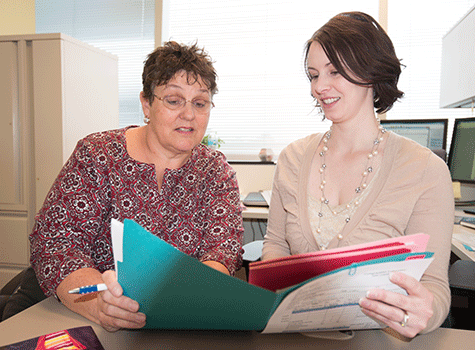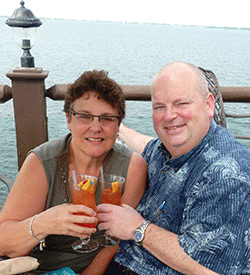
If scientific research were the United Nations, Karen Seibert would be the secretary general.
“There’s nothing I love more than sitting at a table full of experts in many different areas of research, helping a diverse team build and execute a plan,” she said. “Bringing a group like that together to take on important scientific problems is a thrill for me.”
When representatives of different scientific specialties come together, gaps need to be bridged, including differences in perspectives, terminology and culture. Seibert, PhD, research professor of pathology and immunology and of genetics, helps scientists connect and collaborate across these gaps with a convivial mixture of warmth, optimism, enthusiasm and humor.
Seibert first put her diplomatic talents to work as vice president for research at the pharmaceutical giant Pfizer Inc., where she oversaw the development of the arthritis drug Celebrex and other treatments. Since 2011, she has been using her bridge-building skills to establish and direct Genomic Pathology Services (GPS) at Washington University, a groundbreaking service that simultaneously analyzes many different genes to help patients and their doctors identify the best treatment options.
“Karen is one of our very best and a wonderful addition to the faculty,” said Skip Virgin, MD, PhD, the Edward Mallinckrodt Professor and head of the Department of Pathology and Immunology. “She has been pivotal for the development of GPS and in applying the wonders of genomics to patient care.”
Seibert was born in Cleveland in 1959. She is the youngest of her parents’ four children, who were born over a span of 25 years that included the Depression, World War II and the start of the Cold War.
“My father passed away when I was 11, but my mother was with me almost until I was 40,” she recalled. “She saw me through the ride of growing up — college, graduate school, postdoctoral research, employment.”
Seibert remembers her mother with great fondness.
“She found herself widowed with an 11-year-old child at a vulnerable time in life,” she said. “We were very close, and my memories of her often focus on her hands. She could make so many things happen with her hands whether she was at work in crafts, sewing or in just making things happen around the house.”
Seibert, who would go on to knit together scientific disciplines, studied biological sciences at Northwestern University. At that time, the science of genetics was just starting to appear in biology coursework. Seibert, now immersed in GPS, remembers with a laugh that she pledged at age 19 that she would never get involved in genetics, which at the time seemed complex and confounding.
Seibert was unsure what she wanted to do after graduation, but a senior member of the Northwestern faculty who studied entomology, John Bjerke, offered a suggestion.
“He said to me, ‘Miss Seibert, I think you might have an interest in studying pharmacology,’” she recalled. “I kind of dug in on that and ended up getting a graduate scholarship to the Toledo College of Pharmacy, and within two weeks of being there, I knew I had discovered my oasis and found exactly what I wanted to do.”
During a four-year doctoral fellowship at Vanderbilt University, Seibert worked with researchers who were studying how aspirin relieved pain. A mentor suggested that she talk to Philip Needleman, PhD, who at the time was professor and chairman of the Department of Pharmacology at Washington University, about further studies of prostaglandins, molecules known to be involved in pain and inflammation.
Seibert became a postdoctoral fellow in Needleman’s lab not long before the group identified an enzyme known as COX-2 that produces pro-inflammatory prostaglandins. They showed that COX-2 is a critical component in processes that cause inflammation and pain. A short time after that, Needleman, Seibert and others went to work for the pharmaceutical branch of Monsanto Co., which was known as Searle at the time but eventually would become Pfizer.
Seibert spent two decades at Pfizer. Her first 10 years were devoted to the hunt for and development of the popular arthritis pain-relief drug Celebrex. During her second decade there, she became a vice president of research and development for Pfizer’s St. Louis labs and led searches for new treatments for arthritis, heart disease, diabetes and other conditions.

When Pfizer announced plans in 2009 to move all of its research to Cambridge, Mass., Seibert and her husband, Bob Boyd, decided they would stay in St Louis.
“I helped many people from the labs find new jobs across the St. Louis region, but then it got to the question of what I was going to do,” she said. “I knew I wanted to turn the clock back two decades and work in a multidisciplinary environment where I could integrate across research specialties like I did at the start of the search for Celebrex.”
Seibert was contacted by Jeffrey I. Gordon, MD, the Dr. Robert J. Glaser Distinguished University Professor, whom she had known since her time as a postdoctoral associate at the School of Medicine. He was eager to help her find a new role in research.
“Then I had what I call my four-hour cup of coffee with Skip Virgin,” she said.
In that conversation and a later talk with Jeff Milbrandt, MD, PhD, the James S. McDonnell Professor and head of the Department of Genetics, the researchers shared with Seibert “the vision and excitement of what was going on at the medical school in terms of bench-to-bedside research, particularly the potential for genetics to personalize medical treatment,” she recalled.
After networking with researchers from several university departments, Seibert and her new colleagues began work on building GPS, one of the world’s first genomic pathology services.
In 2011, GPS made its first test available, a panel that sequences and analyzes genes that affect a variety of cancers, including blood, lymph, lung, brain, bladder, kidney, skin, stomach, prostate and breast cancers.
Identifying specific mutations in these genes can help doctors decide which treatments are most likely to benefit individual patients.
GPS’ second testing panel, which became available in November, focuses on genes that affect risk of cardiac sudden death. Additional panels for renal diseases, pediatric diseases and other conditions linked to genetics are in the works.
“We’re all very excited at GPS about being on the front edge of a new area of research that is full of challenges,” Seibert said. “What will the regulatory environment for these tests look like? How will these services be paid for? How will they be used and by whom? These are just a few of the issues we will be working out in years to come.”
When she came to St. Louis in 1983 to work with Needleman, Seibert told her husband that they were “going to be in and out of St. Louis in three years.”
She credits their extended stay not only to the joy her work provides but also to the networks of friends she and her husband have made. Seibert has served on the boards of directors of a number of area charities, including the St. Louis YWCA and Lydia House, an agency that supports transitional housing for abused women and their children. She is also active in her church, the United Way and other charities.
Seibert and Boyd, a former medical school administrator at Saint Louis University now active in realty, love to travel and have visited many countries in Europe, Asia and elsewhere. On one of their trips to Hawaii, Seibert found a way to test the degree to which she’d inherited her mother’s talented hands: She became interested in the ukulele.
“I’m a very novice player, but I have two of them, a tenor and a soprano ukulele, and I’m making progress,” she said with a laugh.